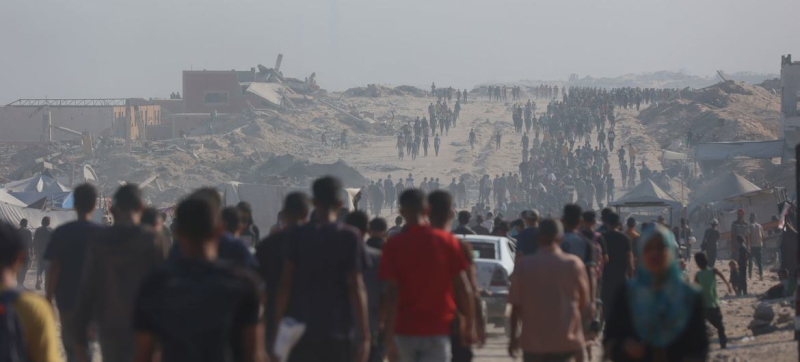- Israel Strikes Tehran with US Support Amid Nuclear Tensions |
- India Sees 9% Drop in Foreign Tourists as Bangladesh Visits Plunge |
- Dhaka Urges Restraint in Pakistan-Afghan War |
- Guterres Urges Action on Safe Migration Pact |
- OpenAI Raises $110B in Amazon-Led Funding |
Famine-Hit Gazans Forced to Scavenge Roads for Food

Crowds move towards an aid delivery point in the northern Gaza Strip.
In Gaza, UN aid teams continued their efforts on Thursday to assist people in the war-shattered enclave by retrieving urgently needed fuel and other supplies from the Kerem Shalom crossing in the south of the Strip.
Without fuel, many essential facilities cannot function — from water treatment plants to medical infrastructure.
Meanwhile, Gazans, now on the brink of famine, have been forced to take desperate measures in their search for food, even scouring the roads travelled by aid convoys, UN aid worker Olga Cherevko told UN News.
“While we were driving, I saw an elderly man on the side of the road, completely alone, kneeling down and picking up handfuls of lentils that had spilled on the ground from one of the previous convoys,” she said.
“He was picking them up with his hands and putting them into his t-shirt. This is obviously the only option he has right now to find food — that’s how desperate the situation has become.”
The latest reports from Gaza indicate that mothers who are unable to breastfeed due to malnutrition are now feeding their babies ground chickpeas, bread, and rice — foods not suitable for infants.
In a social media post, the UN Children’s Fund (UNICEF) stressed that “this is a condition that we can prevent,” and called for increased humanitarian access.
Separately, the UN World Health Organization (WHO) emphasised that “the health needs in Gaza are immense. A continuous flow of medical supplies is critical.”
Meanwhile, health workers on Wednesday reported that at least 50 Gazans were killed and 400 others injured while waiting for food near the Zikim crossing in the north.
Ms. Cherevko, who works with the UN aid coordination office (OCHA), explained that her mission to Kerem Shalom on Thursday morning was delayed at a “holding point” for two hours before being allowed to proceed to the crossing point separating Gaza from Israel.
Although the fuel supplies are welcome, they are far from sufficient, she insisted.
“We need hundreds of thousands of litres of fuel entering every day to power even the most basic of our facilities — water, sanitation, healthcare, emergency telecommunications, and other critical infrastructure,” she said.
The announcement of daytime military pauses by Israel last weekend appears to have slightly reduced the waiting time for aid convoys to receive clearance, she noted.
There has also been a “slight reduction” in security incidents involving Gazans taking food from UN trucks, she added.
In its latest emergency update, OCHA stated that four days since the start of tactical pauses declared by Israel, “we are still seeing casualties among those seeking aid and more deaths due to hunger and malnutrition... Unilateral tactical pauses alone do not allow for the continuous flow of supplies required to meet the immense level of needs in Gaza.”

